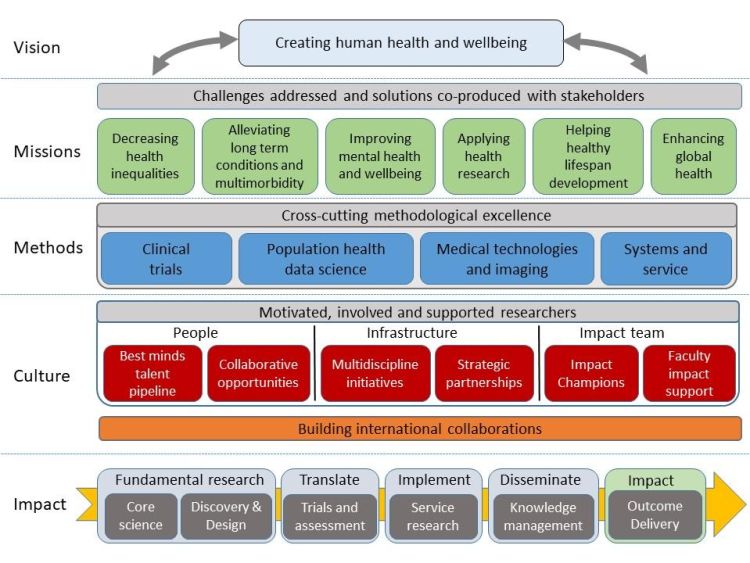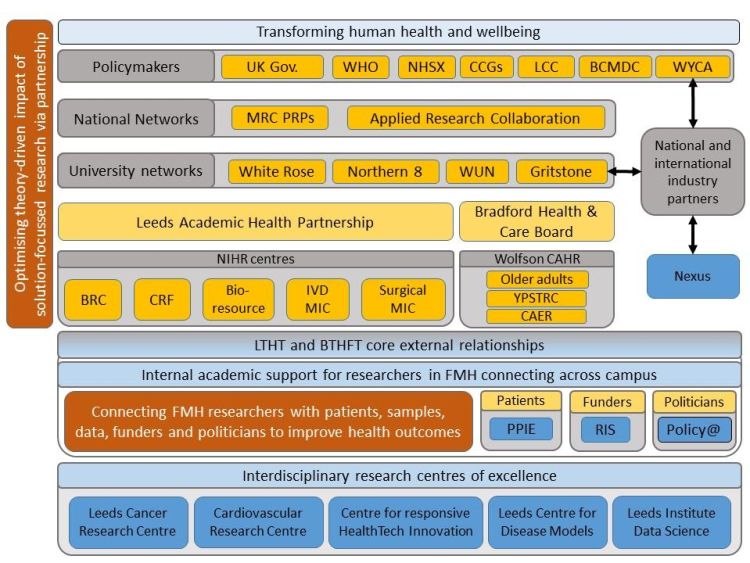Impact Strategy
Our impact strategy aims to accelerate the translation process between research excellence and societal impact, in order to achieve our vision of improving the health and wellbeing of the population.
Figure 1: Our strategy

Our strategy encompasses the exchange, synthesis, and application of research evidence to fast track research from academic to practice and policy settings. We focus on using our research as a mechanism for enabling positive societal change.
Our approach recognises the diverse and context-sensitive ways in which research can make a difference, and we support our academics to adopt the following approaches to engaging with external stakeholders:
We support our academics to disseminate knowledge to the users of research through generating materials that are accessible to practitioners and policy makers (including but not restricted to published reports, conference presentations, website summaries)
We stimulate a demand for knowledge amongst potential users, e.g. highlighting research-in-progress (including but not restricted to demonstrating how high quality research can improve outcomes)
We organise activities that bring researchers and interested parties together to discuss research needs, findings and plans (including but not restricted to: working with stakeholders to identify research priorities; involving research users in planning, conducting and disseminating research; promoting exchange via social media).
Environment
We underpin our strategy through the creation of an environment of motivated, involved, and supported impact minded researchers.
Impact culture within the Faculty is coordinated through a Professorial Impact Lead (Prof Mark Mon-Williams) together with a full time Research Impact Manager (Andy Cameron). We foster an Impact environment through 10 impact champions who make certain that impact is a strategic priority within every school and institute.
The Champions oversee Impact Working Groups for each of the schools within the Faculty, with the following goals:
- To recognise and support existing peaks of excellence in impact delivery (research areas that have achieved impact) with the capacity and motivation to build on this impact delivery over the 2020-25 period.
- To identify excellence in impact planning and evaluation (research areas that have clear impact aims and credible plans to deliver these aims with effective and pragmatic evaluation methods)
- To provide capacity and motivation for academics to act on impact plans over the 2020-25 period.
- To ensure that Schools prioritise research with the potential for impact.
- To support staff in developing sustainable plans for progress in impactful research (via the provision of competitive Impact Accelerator Accounts).
Community and culture
Our strategy recognises that conducting interdisciplinary research with global impact is key to achieving our vision. The scale and complexity of our Impact agenda, however, demands interdisciplinary partnerships that extend beyond the research community.
We implement our research culture through the coordination of impactful major research initiatives across campus that tackle real-world challenges and global priorities. This includes driving the creation of new Centres and Institutes in line with our research strengths, vision and missions. The creation of new Centres is overseen by the University’s ‘Major Research Initiative’ board who ensure that new initiatives align with the University’s vision for generating societal impact at a City, Regional, National and International scale.
Our strategy recognises that effective translation of research excellence can only happen in partnership with external stakeholders. We therefore target our investments towards important strategic partnerships that help our researchers co-produce the impact with the end users. In order to accelerate impact, our translation pipeline includes public and patients; service commissioners and providers; policy makers (local and central), planners and regulatory bodies; professional bodies; third sector and charity organisations, and industry.
Figure 2: Infrastructure supporting our vision

We enjoy a particularly close and strategic partnership with the Leeds Teaching Hospitals NHS Trust (LTHT). The University and LTHT have a long history of collaboration in the pursuit of scientific excellence and its translation into education and healthcare practice. For example, we have established a formal joint research framework agreement to promote and expedite improved patient care.
We put patients and the public at the centre of what we do, ensuring they are actively involved in our research in multiple ways, from early development of research ideas to dissemination activities. We develop information sheets that ensure research is understood by research participants, include patients and the public as members of our research project advisory groups, and involve them as trained researchers by helping us to conduct interviews with participants. Importantly, we engage them to help us understand the results of our research and ensure findings are reported well, and encourage them to disseminate our research findings.
The University co-founded the Leeds Academic Health Partnership (LAHP), which brings together expertise from all the NHS organisations in Leeds, three of the city’s universities, and Leeds City Council. The Partnership, one of the biggest of its kind in the UK, aims to improve health and wellbeing by engaging academic capabilities in education and research with the health and social care system across the Region to accelerate the adoption of research and innovation.
The University created the Wolfson Centre for Applied Health (CAHR) with the University of Bradford and the Bradford Teaching Hospital Foundation Trust. CAHR provides a regional hub that allows our academics to transfer knowledge across different Regional NHS Trusts, connect with a range of CCGs, and extend the breadth of external partners within the impact ecosystem.
CAHR houses the NIHR Yorkshire Patient Safety Translational Research Centre. (YPSTRC) The YPSTRC is one of only three such centres funded by the NIHR in England. The centre is a collaboration between the University and the Bradford Teaching Hospitals Foundation Trust, and provides an impact route that enables research to be translated to clinical settings to make healthcare safer.
The University plays a central role in the Yorkshire and Humber Applied Research Collaboration (ARC) and supports the ARC through matched funding of our academics’ time. The ARC supports people-powered research that aims to tackle inequalities, and improve health and well-being for our communities. We support our academics to play an active role within the ARC in order to drive forward our impact agenda.
The NIHR Leeds Biomedical Research Centre (BRC) is a world-leading centre for translational research into therapies across musculoskeletal diseases. The centre brings together two leading University of Leeds research institutes, the Leeds Institute of Rheumatic and Musculoskeletal Medicine (LIRMM) and the Institute of Medical and Biological Engineering (iMBE) with LTHT.
Internationally, we embed research within health systems in low-resource settings, prioritising antimicrobial resistance, non-communicable diseases and the impact of climate change on health. We develop methods applied to large-scale international consumer data to model trends in sustainable nutrition and global health, through directorship of the WHO Collaborating Centre in Nutrition Epidemiology.
We have created a bespoke service to support our academics connect with industrial partners. Our Nexus building enables businesses from all sectors to benefit from the expertise, talent and facilities at the University of Leeds. Nexus allows our academics to fast track and de-risk innovation in a manner that allows businesses to maximise their commercial returns.
Policy Leeds is the connecting hub for research-policy engagement at the University of Leeds. It strengthens the influence and impact of University of Leeds research on policy design, delivery and impact at the local, national and internationals levels.

